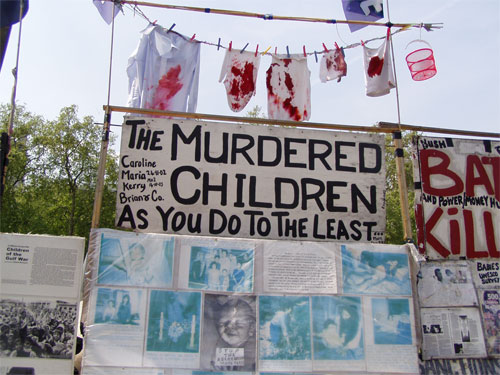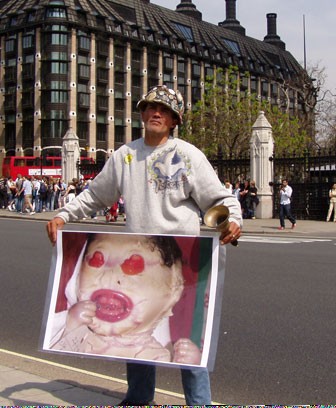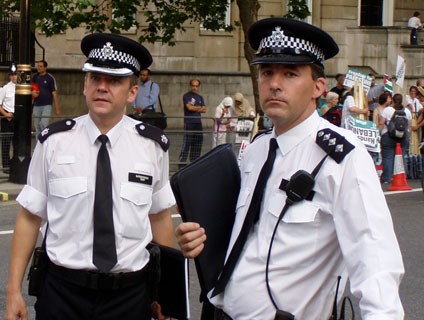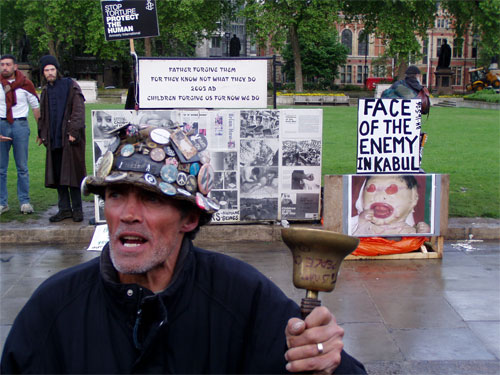SOCPA - brian haw - day three
rikki | 14.12.2006 02:09 | SOCPA | Anti-militarism | Repression | Social Struggles | London

one of the banners removed

afghan baby - result of depleted uranium

superintendent terry and inspector robinson

3 metres
the prosecution council, hugo keith (who was strangely reticent to offer me his name when asked, even though it had been given out earlier in open court), then summed up the case for the prosecution.
as far as the letter passing delegation to terry, he said that as the file which enclosed it had been dated for 'retainment' (police storage) in august 2005, this was well before the time that terry imposed conditions on brian and so a specific date on the letter was not important.
he then referred to various authorities and an apparently well-known case (in legal circles) which has become known as the 'carltona' doctrine (?), which in conjunction with birmingham justices comments in an asbo case seemed to provide much evidence for the right to delegate authority. macdonald asked the prosecution to read out a particular paragraph which they weren't intending to which undermined the case slightly by introducing the idea that powers could only be delegable when the administrative need "very much outweighed" the express statutory delegation, and also used the phrase that "all but the most important" powers are delegable.
the prosecution pointed out that the socpa legislation allows notifications to be delivered at any police station and suggested this showed that parliament couldn't possibly have meant that every application had to go to the commissioner, and also that under section 134(3) there were several things to consider in each case, such as whether a demonstration might hinder entrance to westminster, disrupt the life of the community, lead to public disorder and so on. he pointed out that this year there have been between 1200 and 1400 applications (with passing reference to mark thomas' campaign of mass lone demonstrations), and that the commissioner clearly had better things to do than sit down with this lot.
mr keith then went into superintendent terry's background and experience, to show that as far as setting conditions and controlling demonstrations, he was absolutely the best man for the job. at this point the judge interjected that terry's qualifications were not in question and that if indeed delegation were lawful, there's no doubt terry would be the man to delegate to, but that this wasn't relevant.
the prosecution then hoped to show precedents of delegation, referring to examples where in law, parliament has set powers to delegate, for instance in housing cases and health and safety cases. he also referred to the police act 86 where there is explicit mention of delegation from the commissioner to assistant commissioner (a rank higher than terry's). he suggested that since socpa didn't expressly limit any delegation to any particular rank it implied there was no reason not to believe that delegation to a lower rank may be permissible. he admitted that in the wording of previous public order acts delegation was permitted only to named high ranks, but suggested that in those cases, very few demos required public order control, whereas in the case of socpa EVERY notification requires notification and then authorisation, amounting to hundreds.
at this point brian haw, who had been sitting quietly behind glass in the prisoner's dock at the rear of the court, made some observations. throughout the trial, superintendent terry and inspector robinson have been sitting in the court (after their witness statements), and they have free access to the counsel, passing notes, whispering, passing other documents and so on. meanwhile brian has no such access to his brief to comment on matters as they emerge. this didn't seem fair to brian, given the fact that terry and robinson aren't just there as met representatives but are also witnesses giving evidence under oath. judge purdy was not impressed by the interjection and warned brian to be silent, but it took a while to quieten him down as he was clearly upset over what he regarded an abuse of process. eventually, a compromise was agreed, and the bindman's instructing solicitor sat with him in the dock to make notes.
the prosecution counsel finished his observations on delegation by stating again that terry is eminently suitable to deal with issues of authorisation and conditions and it was not parliament's intention to swamp the commissioner with this task.
moving on the subject of human rights, he referred to a case introduced earlier by the defence relating to a hunt sab who was bound over to maintain 'good behaviour'. in that case the european union court had ruled that this condition 'proscribed by law' was insufficiently clear, and so ruled against it. in brian's case, the prosecution argued, the reasons for imposing conditions are set out clearly in the socpa legislation, and the conditions imposed by terry are clear in those precise categories (as stated in section 134(3)). he argued that in setting conditions it would be impossible to make a completely exhaustive list, and that as long as they are 'reasonable and common-sense' then the argument of unforseeablity or lack of clarity will not stand. he also mentioned that brian had not actually sought any clarification from terry, and that brian had acknowledged he'd breached the conditions. at this point both brian and his defence barrister intervened to make the point that brian had never acknowledge breach of conditions.
mr keith carried on, asserting that 'laws are of necessity vague', but that the conditions were clear enough. condition 1 was a plain phrase to simply reduce the size of the demo. conditions 4 and 5, which he admitted posed more difficulty, were phrased in plain english, and finally he said that condition 6 (limiting brian's demo to 20 participants) was 'clearly not a part of condition 1 and that further communication from peter terry had made this clear.
he then moved on to the issue of proportionality. given the legitimate aims as proscribed in socpa he said the court must weigh up whether the conditions were necessary in order to achieve those aims. he pointed out that the conditions do not prevent brian from continuing his protest, that he still has a considerable presence outside westminster, that he can use his loud-hailer at times, and so on. given the level of risk that the area clearly attracts, the act of his demonstration remains relatively unconstrained, and the wording of the conditions would have had to be far more egregious to be considered a breach of brian's human rights. he asked the court to consider that brian's demo was a permanent demonstration, and that the conditions were designed with this in mind and clearly refer to the permanent part of his site. mr keith contended that brian himself has created the risk by the nature of his demonstration and the by the manner in which he chose to protest.
the prosecution suggested that the police had acted in good faith throughout, that they'd always been concerned about the security risk and conveyed this to brian but not had the legislative power to deal with it until socpa. he dismissed defence arguments that the police were clearly not really that worried about security. he said that in reality very few conditions had been set - a tribute, he said, to superintendent terry's rationality and restraint, and that those conditions weren't so onerous. he said that brian had never seriously suggested alternatives and that cctv was not enough on it's own and constant police surveillance was not a sensible use of resources. finally he returned to the airport analogy, suggesting that brian was being asked to do no more than that required of passengers. the judge interrupted at this, to point out that keeping bags about you at an airport isn't actually a legal duty with criminal sanctions!
the prosecution counsel summed up by saying that condition 1 was proportionate and reasonable, as brian obviously hadn't had clear lines of sight over all his display and that some articles seen around his site had indeed appeared suspicious. he agreed that there is no parliamentary definition of the phrase "disruption to the life of the community", but that there was no doubt that brian's demo had affected others trying to protest in the area. mr keith praised the 'skillful advocacy' of ian macdonald in belittling the condition 4 reference to articles within other articles, but said it was clear that there were items of risk and it was only common-sense. he finished with a contention that brought a gasp in the public gallery from those who know some of the history of charing cross' dealings with peace protesters who have challenged socpa - he said that brian is both admired and respected by the police and that they support him!
ian macdonald rose to give his final response to the prosecution arguments, and began with the issue of delegation. referring once more to judge sedley's interpretation of the carltona(?) doctrine, he quoted that "all but the most important functions are likely to be delegable". he suggested that "the most important functions" must surely include conditions that can affect people's exercise of their human rights. he also reminded the court that in law a basic principle (known as the first rule of construction) was to accept the simple interpretation of the words, and the sopca act simply states that the commissioner is responsible for authorising and imposing conditions. there was no argument that terry had the ability and experience to advise the commissioner, but given the fact that only a handful of demos actually required conditions and that all the rest were automatically authorised, this was not too onerous on the commissioner. so the answer to whether this is 'a most important function' must be yes, both in simple interpretation of the words, and in the scheme of the act where most authorisations are automatic.
moving on to the human rights arguments, he said there was no contention on either side that whether you focus on article 10, article 11, or even public law, the issues are pretty much the same, but for the sake of argument he was taking the article 10 approach. returning to the theme that anything 'proscribed by law' must be sufficiently clear so that a citizen can take steps to avoid falling foul, he went back to those conditions. number 1 states that brian's display must fit into a space 3m x 3m x 1m. this seems clear until you reference it to the other conditions, and ian macdonald contended that for the overall conditions to be sufficiently clear they must work with each other. the police removed most of brian's display on 23rd may and imposed the 3x3x1 size restriction. but for brian to fulfill condition 3 he needed supporters at the site, and this would surely have breached condition 1. through his solicitor, bindman's, brian sought clarification and the police response suggested that seemingly condition 1 only applies sometimes.
moving on to sections 4 and 5, mr macdonald reminded the court that even mr keith had admitted they 'posed more difficulty' and then reminded us of the laughable testimony of officer riley who was the man sent to observe breaches of the conditions - he had said that brian haw may have been in breach while in his own bed.
he suggested that although it may be correct that it is impossible to cover every eventuality, we are not dealing here with general laws, but with a set of individual legislation applying to a particular scenario and just one man, and in this context the precision expected should be very much greater.
after a break for lunch, the defence concluded with some observations about proportionality. brian haw clearly has a fundamental right to put up placards and shout, but the state has a right to interfere on the public interest grounds set out in the human rights act. it is the balance that the court must find.
the central plank of the crown's argument is the issue of security - the issue of disruption to the life of the community is of virtually no importance by comparison. the imposition of the 3x3x1 dimension was an arbitrary and draconian reduction amounting to just over 90% of brian's original site. this must be a disproportionate response to the risk of someone secreting an improvised explosive in the vicinity. in the times that police made scheduled irregular visits as well as cctv surveillance and of course brian's own vigilance there had never ever been a security scare, and indeed brian had reported items as possibly suspicious and the police had not responded. between 2004 and 2006 (as seen in two videos in court) there doesn't seem to have been any incremental increase in size, and there is no evidence that the police do not have the resources to do scheduled site visits as before.
and finally, ian macdonald pointed out it was not just brian's vigilance that guaranteed safety, but also his message of universal peace. what terrorist would plant a bomb likely to kill the man who has stood for peace for more than five years?
the judge said he would need time to consider all the arguments and study all the case law and authorities. so a date was set for the decision. remember, this is in response to the defence submission that there is no case to be answered. if the judge agrees, it will mean that the police action on may 23rd was not covered by section 3 of the criminal law act, and will have been unlawful. this will also mean that the two people charged with obstruction that night cannot be prosecuted, and it will open up superintendent terry to possible charges of theft resulting from the police operation that night. on the other hand, if the judge decides there is still a case to answer, then the defence will call witnesses including brian himself and the trial will continue.
the decision will be heard at horseferry road magistrates court at 10am on monday 22nd january 2007, and supporters are warmly welcomed at the court.
if you read this far, i hope it's been useful to you, and thanks for the previous messages of support for these court reports - it's good to know someone actually reads all this stuff!
rikki
 e-mail:
rikkiindymedia@googlemail.com
e-mail:
rikkiindymedia@googlemail.com

Comments
Display the following 10 comments